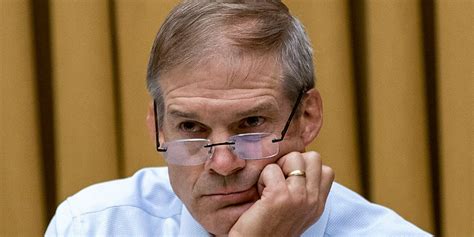
Jim Jordan, the Ohio Republican Congressman, faced swift and widespread backlash on social media after posting a message decrying the state of America under President Biden’s leadership. Jordan’s post, which simply read, “Real America is done with Joe Biden,” triggered a torrent of criticism and mockery, with many users pointing to what they saw as the hypocrisy and lack of self-awareness in his statement, given his long tenure in Washington and his alignment with policies that they argue have contributed to the very problems he criticizes.
Representative Jim Jordan’s recent social media post has ignited a firestorm of controversy, drawing sharp criticism and ridicule from a broad spectrum of online users. The Ohio Republican’s message, seemingly intended to rally support against President Joe Biden, instead sparked a wave of counterarguments and sardonic commentary, highlighting the perceived disconnect between Jordan’s words and his long-standing role in Washington politics. This incident underscores the growing tension and divisiveness that characterize the current political landscape, where even seemingly straightforward statements can quickly become fodder for intense debate and public scrutiny.
Jordan’s original post, a concise declaration posted on X (formerly Twitter), stated, “Real America is done with Joe Biden.” The simplicity of the message belied the complexity of the reaction it provoked. Critics were quick to point out that Jordan, a prominent figure in the House of Representatives for nearly two decades, has been an integral part of the political establishment he appears to be denouncing. Many argued that his policy positions and voting record have directly contributed to the issues he now seems to lament.
The response on social media was immediate and voluminous. Users from across the political spectrum weighed in, offering a range of perspectives that challenged Jordan’s assertion. Some criticized his track record on issues such as healthcare, environmental protection, and economic policy, arguing that his actions have consistently favored corporate interests and wealthy donors at the expense of ordinary Americans. Others pointed to his unwavering support for former President Donald Trump, whose policies and rhetoric have been widely criticized for exacerbating social and economic divisions.
Many responses took a more humorous approach, with users employing sarcasm and mockery to underscore what they perceived as the absurdity of Jordan’s statement. Memes, GIFs, and satirical comments flooded social media platforms, turning Jordan’s message into a viral sensation for all the wrong reasons.
One common theme among the critical responses was the accusation of hypocrisy. Many users highlighted the fact that Jordan has been a fixture in Washington for years, benefiting from the perks and privileges of political office while simultaneously railing against the establishment. They argued that his attempt to portray himself as an outsider fighting against the system rang hollow, given his long and well-documented history as an insider.
The incident also served to highlight the deep divisions within American society and the challenges of political communication in the digital age. In an era of instant information and constant connectivity, politicians are increasingly vulnerable to public scrutiny and criticism. A single tweet or Facebook post can quickly spiral out of control, sparking a controversy that dominates the news cycle and shapes public opinion.
Jordan’s “Real America” comment echoes a familiar trope in American politics, one that seeks to define and delineate who truly belongs to the nation and who does not. This type of rhetoric often relies on exclusionary language and appeals to a narrow segment of the population, while alienating others. Critics argue that it is a divisive and dangerous tactic that undermines the principles of inclusivity and equality upon which the country was founded.
The controversy surrounding Jordan’s tweet also underscores the importance of context and nuance in political discourse. In a complex and rapidly changing world, simplistic slogans and sound bites often fail to capture the full scope of the issues at hand. Critics argue that Jordan’s message was overly simplistic and lacked any meaningful analysis or understanding of the challenges facing the country.
Furthermore, the incident raises questions about the role of social media in shaping political narratives. While social media can be a powerful tool for communication and mobilization, it can also be a breeding ground for misinformation, propaganda, and hate speech. Politicians who rely on social media to communicate with their constituents must be aware of these risks and take steps to ensure that their messages are accurate, responsible, and respectful.
In the aftermath of the controversy, Jordan has remained largely silent on the issue. He has not issued a public apology or clarification, nor has he addressed the criticisms leveled against him. This silence has only served to fuel the fire, with critics accusing him of being out of touch and unwilling to engage in meaningful dialogue.
The incident serves as a cautionary tale for politicians of all stripes. In an age of heightened scrutiny and instant feedback, it is more important than ever to communicate with clarity, honesty, and empathy. Politicians who fail to do so risk alienating their constituents and undermining their own credibility.
The backlash against Jim Jordan’s tweet also reflects a broader trend of increasing skepticism towards political elites and institutions. In recent years, there has been a growing sense of disillusionment among many Americans, who feel that their voices are not being heard and that their concerns are not being addressed. This disillusionment has fueled the rise of populist movements on both the left and the right, and it has made it more difficult for traditional politicians to connect with ordinary voters.
To regain the trust of the American people, politicians must demonstrate a genuine commitment to serving the public interest and addressing the challenges facing the country. They must be willing to listen to different perspectives, engage in constructive dialogue, and work together to find common ground. They must also be transparent and accountable in their actions, and they must be willing to admit when they have made mistakes.
Jim Jordan’s “Real America” tweet may have been intended as a simple political statement, but it has become a symbol of the deep divisions and challenges facing American society. The controversy surrounding the tweet serves as a reminder of the importance of critical thinking, responsible communication, and genuine engagement in the political process. It also underscores the need for politicians to be more attuned to the concerns of ordinary Americans and to demonstrate a genuine commitment to serving the public interest.
The online furor highlights the power of social media to amplify dissenting voices and hold public figures accountable for their words and actions. It also underscores the importance of context and authenticity in political communication. In an era where every statement is scrutinized and dissected, politicians must be careful to craft messages that resonate with their constituents and reflect their true values.
Moreover, the incident reflects the broader challenges of political polarization and tribalism that plague American society. In an environment where people are increasingly divided along ideological lines, it can be difficult to find common ground and engage in constructive dialogue. This polarization makes it harder to solve complex problems and undermines the ability of the country to come together and move forward.
To overcome these challenges, it is essential to promote greater understanding and empathy across ideological divides. This requires a willingness to listen to different perspectives, challenge one’s own assumptions, and engage in respectful conversation. It also requires a commitment to seeking out common ground and working together to find solutions that benefit all Americans.
Ultimately, the controversy surrounding Jim Jordan’s tweet is a reminder that words matter. In the age of social media, every statement has the potential to reach a vast audience and shape public opinion. Politicians must be mindful of the power of their words and use them responsibly to promote understanding, unity, and progress.
The incident also points to a potential shift in how political narratives are constructed and disseminated. Traditional media outlets no longer hold a monopoly on information, as social media platforms have emerged as powerful forces in shaping public discourse. This shift has both positive and negative implications. On the one hand, it allows for a more diverse range of voices to be heard and challenges traditional gatekeepers of information. On the other hand, it can also contribute to the spread of misinformation and the amplification of extremist views.
In this evolving media landscape, it is crucial for citizens to be critical consumers of information and to seek out multiple perspectives before forming opinions. It is also important for social media platforms to take steps to combat the spread of misinformation and to promote responsible online behavior.
The backlash against Jim Jordan’s tweet also underscores the growing importance of online activism and grassroots organizing. Social media has made it easier for people to connect with like-minded individuals and to mobilize around shared causes. This has led to the rise of online movements that have had a significant impact on political discourse and policy outcomes.
Politicians who ignore the power of online activism do so at their own peril. In order to be successful in the digital age, they must be willing to engage with their constituents online, listen to their concerns, and respond to their needs. They must also be prepared to face criticism and to defend their positions in a public forum.
The controversy surrounding Jim Jordan’s tweet is a complex and multifaceted issue that reflects the many challenges facing American society today. It is a reminder of the importance of critical thinking, responsible communication, and genuine engagement in the political process. It also underscores the need for politicians to be more attuned to the concerns of ordinary Americans and to demonstrate a genuine commitment to serving the public interest. The episode also underscores the pervasive influence of social media on contemporary political discourse and the potential for seemingly innocuous statements to trigger widespread controversy and condemnation. It’s a powerful illustration of how digital platforms can be used to challenge established narratives and hold public figures accountable for their actions and words.
The incident serves as a microcosm of the broader political polarization gripping the United States, where even simple statements can become flashpoints for intense ideological conflict. The rapid and widespread condemnation of Jordan’s tweet suggests a growing level of frustration and dissatisfaction with the current political climate, as well as a heightened awareness of the perceived hypocrisy and disconnect between elected officials and the constituents they represent. The challenge moving forward lies in fostering more constructive dialogue and finding common ground amidst the increasingly fractured landscape of American politics.
The incident also sheds light on the shifting dynamics of political communication in the digital age. With the rise of social media, politicians are no longer able to control the narrative as easily as they once could. Every statement they make is subject to immediate scrutiny and potential backlash. This requires them to be more careful and deliberate in their communication strategies, and to be prepared to respond to criticism in a timely and effective manner. The Jordan incident demonstrates that a single tweet can quickly spiral out of control, damaging a politician’s reputation and undermining their credibility.
The online response to Jordan’s comment also highlights the increasing importance of authenticity in politics. Voters are increasingly drawn to candidates who they perceive as genuine and relatable. They are less likely to trust politicians who seem to be putting on an act or who are out of touch with the concerns of ordinary people. Jordan’s tweet may have been seen as inauthentic by some because it appeared to contradict his own role as a long-time member of the political establishment.
The controversy surrounding Jim Jordan’s tweet is a reminder that in the age of social media, every politician is under constant surveillance. Their words and actions are subject to immediate scrutiny, and any misstep can have serious consequences. In order to be successful, politicians must be authentic, transparent, and responsive to the concerns of their constituents. They must also be prepared to engage in constructive dialogue and to work together to find solutions to the challenges facing the country. The incident is a vivid illustration of the power of social media to shape political narratives and hold public figures accountable, underscoring the need for politicians to exercise caution and mindfulness in their online communication.
Frequently Asked Questions (FAQ)
1. What was Jim Jordan’s controversial tweet about?
Jim Jordan posted a message on X (formerly Twitter) stating, “Real America is done with Joe Biden.” This seemingly simple statement sparked a large amount of criticism and mockery, with many users claiming hypocrisy given Jordan’s long tenure in Washington and his support for policies they believe contributed to the issues he was criticizing.
2. Why did Jim Jordan’s tweet receive so much backlash?
The backlash stemmed from a perception of hypocrisy. Critics pointed out that Jordan has been a member of Congress for nearly two decades and has supported policies that they argue have contributed to the problems he now criticizes. Many felt his attempt to portray himself as an outsider was disingenuous. Also, many users took issue with the exclusionary implication of defining a “Real America,” arguing it was divisive.
3. What were some of the criticisms leveled against Jim Jordan in response to his tweet?
Criticisms included:
- Accusations of hypocrisy, given his long career in Washington.
- Arguments that his policy positions have harmed ordinary Americans.
- Condemnation of his support for former President Donald Trump.
- Assertions that his message was overly simplistic and lacked understanding of complex issues.
4. How has Jim Jordan responded to the criticism of his tweet?
As of the latest reports, Jim Jordan has remained largely silent on the issue. He has not issued an apology, clarification, or addressed the criticisms directly. This silence has further fueled the controversy.
5. What does this incident reveal about the current state of American politics and social media?
The incident highlights several key aspects:
- Deep political divisions and polarization within American society.
- The power of social media to amplify dissenting voices and hold politicians accountable.
- The importance of authenticity and context in political communication.
- The increasing skepticism towards political elites and institutions.
- The growing influence of online activism and grassroots organizing.
- The erosion of trust in political figures.
- The heightened scrutiny of elected officials’ statements on social media.
- The challenges of effective political communication in a hyper-partisan environment. The controversy around Jim Jordan’s tweet is a notable example of how even seemingly simple statements can ignite intense debate and highlight the complexities of modern political discourse. The situation brings to light the changing nature of media consumption, where social media has become a significant platform for political commentary and critique. The incident reflects the ongoing struggle to define and understand the diverse perspectives and values that exist within the United States. The backlash against Jordan’s tweet also suggests a growing demand for accountability and transparency from elected officials, particularly in their online communications.
The furor surrounding Jordan’s tweet also points to a broader trend of increasing engagement with political issues on social media, as well as a willingness to challenge established narratives and hold public figures accountable for their words and actions. The incident underscores the need for politicians to exercise caution and mindfulness in their online communication, as their words can have a significant impact on public opinion and their own reputations.
The controversy also raises questions about the role of social media companies in regulating political speech and combating misinformation. The incident is a reminder that in the age of social media, every politician is under constant scrutiny, and their words and actions are subject to immediate judgment. The backlash against Jordan’s tweet may also reflect a growing sense of frustration with the lack of progress on key issues facing the country, such as healthcare, economic inequality, and climate change. The incident is a microcosm of the broader political divisions that are tearing apart American society, and it highlights the challenges of finding common ground and building consensus in an increasingly polarized environment. The controversy surrounding Jordan’s tweet is also a reminder of the importance of critical thinking and media literacy, as it is essential for citizens to be able to evaluate information and identify bias in order to form informed opinions. The incident serves as a cautionary tale for politicians, highlighting the need to be authentic, transparent, and responsive to the concerns of their constituents. The online response to Jordan’s tweet also underscores the importance of grassroots organizing and online activism, as social media has become a powerful tool for mobilizing people and advocating for change. The controversy surrounding Jordan’s tweet is a reminder that in the age of social media, every politician is accountable for their words and actions, and they must be prepared to defend their positions in a public forum. The incident also reveals the importance of understanding the nuances of language and the potential for misinterpretation, as even seemingly simple statements can be taken out of context and used to fuel political controversy. The backlash against Jordan’s tweet may also reflect a growing desire for more civil and respectful political discourse, as many Americans are tired of the constant negativity and divisiveness that characterize the current political climate. The incident serves as a reminder that in order to bridge the political divide and build a more united society, it is essential to foster understanding, empathy, and respect for different perspectives. The controversy surrounding Jordan’s tweet is a reminder that in the age of social media, every politician is under constant pressure to respond to criticism and defend their positions, and they must be prepared to do so in a timely and effective manner.
The incident also brings to light the complexities of defining “Real America,” and the potential for such definitions to be exclusionary and divisive.
The fact that Jordan’s statement became a viral sensation demonstrates the power of social media to amplify dissenting voices and hold public figures accountable. It also highlights the importance of context and authenticity in political communication. In an era where every statement is scrutinized and dissected, politicians must be careful to craft messages that resonate with their constituents and reflect their true values.









